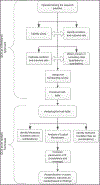Innovations in Mixed Methods Evaluations
- PMID: 30633710
- PMCID: PMC6501787
- DOI: 10.1146/annurev-publhealth-040218-044215
Innovations in Mixed Methods Evaluations
Abstract
Mixed methods research-i.e., research that draws on both qualitative and quantitative methods in varying configurations-is well suited to address the increasing complexity of public health problems and their solutions. This review focuses specifically on innovations in mixed methods evaluations of intervention, program or policy (i.e., practice) effectiveness, and implementation. The article begins with an overview of the structure, function, and process of different mixed methods designs and then provides illustrations of their use in effectiveness studies, implementation studies, and combined effectiveness-implementation hybrid studies. The article then examines four specific innovations: procedures for transforming (or "quantitizing") qualitative data, application of rapid assessment and analysis procedures in the context of mixed methods studies, development of measures to assess implementation outcomes, and strategies for conducting both random and purposive sampling, particularly in implementation-focused evaluation research. The article concludes with an assessment of challenges to integrating qualitative and quantitative data in evaluation research.
Keywords: effectiveness; evaluation; hybrid designs; implementation; methodology; mixed methods.
Figures



References
-
- Albright K, Gechter K, Kempe A. 2013. Importance of mixed methods in pragmatic trials and dissemination and implementation research. Acad. Pediatr 13:400–7 - PubMed
-
- Beebe J 1995. Basic concepts and techniques of rapid appraisal. Hum. Org 54:42–51
Publication types
MeSH terms
Grants and funding
LinkOut - more resources
Full Text Sources
Medical

